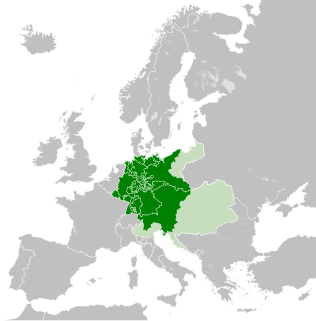 W
WThe German Confederation was an association of 39 predominantly German-speaking sovereign states in Central Europe, created by the Congress of Vienna in 1815 as a replacement of the former Holy Roman Empire, which had been dissolved in 1806. The German Confederation did not include certain German-speaking lands in the eastern portion of the Kingdom of Prussia, the German-speaking cantons of Switzerland, and the French region of Alsace, which was predominantly German-speaking.
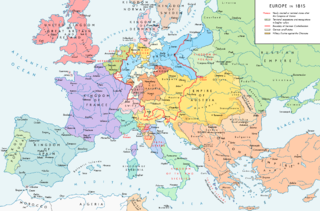 W
WThe Congress of Vienna of 1814–1815 was one of the most important international conferences in European history. It remade Europe after the downfall of French Emperor Napoleon I. It was a meeting of ambassadors of European states chaired by Austrian statesman Klemens von Metternich, and held in Vienna from November 1814 to June 1815. The objective of the Congress was to provide a long-term peace plan for Europe by settling critical issues arising from the French Revolutionary Wars and the Napoleonic Wars. The goal was not simply to restore old boundaries but to resize the main powers so they could balance each other and remain at peace. The leaders were conservatives with little use for republicanism or revolution, both of which threatened to upset the status quo in Europe. France lost all its recent conquests while Prussia, Austria and Russia made major territorial gains. Prussia added smaller German states in the west, Swedish Pomerania, and 60% of the Kingdom of Saxony; Austria gained Venice and much of northern Italy. Russia gained parts of Poland. The new Kingdom of the Netherlands had been created just months before and included formerly Austrian territory that in 1830 became Belgium.
 W
WThe Gastein Convention, also called the Convention of Badgastein, was a treaty signed at Bad Gastein in Austria on 14 August 1865. It embodied agreements between the two principal powers of the German Confederation, Prussia and Austria, over the governing of the 'Elbe Duchies' of Schleswig, Holstein and Saxe-Lauenburg.
 W
WThe First Geneva Convention for the Amelioration of the Condition of the Wounded in Armies in the Field, held on 22 August 1864, is the first of four treaties of the Geneva Conventions. It defines "the basis on which rest the rules of international law for the protection of the victims of armed conflicts." After the first treaty was adopted in 1864, it was significantly revised and replaced in 1906, 1929, and finally 1949. It is inextricably linked to the International Committee of the Red Cross, which is both the instigator for the inception and enforcer of the articles in these conventions.
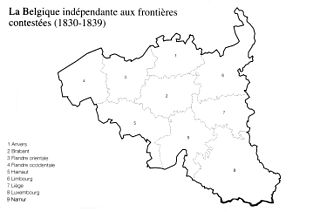 W
WThe Treaty of London of 1839, also called the First Treaty of London, the Convention of 1839, the Treaty of Separation, the Quintuple Treaty of 1839, or the Treaty of the XXIV articles, was a treaty signed on 19 April 1839 between the Concert of Europe, the United Kingdom of the Netherlands and the Kingdom of Belgium. It was a direct follow-up to the 1831 Treaty of the XVIII Articles which the Netherlands had refused to sign, and the result of negotiations at the London Conference of 1838–1839.
 W
WThe Treaty of London, often called the Second Treaty of London after the 1839 Treaty, granted Luxembourg full independence and neutrality. It was signed on 11 May 1867 in the aftermath of the Austro-Prussian War and the Luxembourg Crisis. It had wide-reaching consequences for Luxembourg and for relations among Europe's Great Powers.
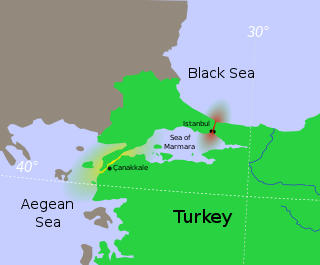 W
WIn the London Straits Convention concluded on 13 July 1841 between the Great Powers of Europe at the time—Russia, the United Kingdom, France, Austria and Prussia—the "ancient rule" of the Ottoman Empire was re-established by closing the Turkish Straits, which link the Black Sea to the Mediterranean, from all warships whatsoever, barring those of the Sultan's allies during wartime. It thus benefited British naval power at the expense of Russia as the latter lacked direct access for its navy to the Mediterranean.
 W
WThe fourth Peace of Pressburg was signed in Pressburg on 27 December 1805 between French Emperor Napoleon Bonaparte and Holy Roman Emperor Francis II, as a consequence of the French victories over the Austrians at Ulm and Austerlitz. A truce was agreed on 4 December, and negotiations for the treaty began. The treaty was signed in Pressburg, Hungary, by Johann I Josef, Prince of Liechtenstein, and the Hungarian Count Ignác Gyulay for the Austrian Empire and Charles Maurice de Talleyrand for France.
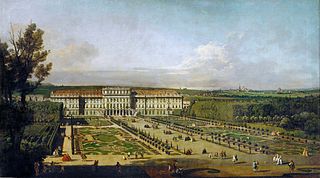 W
WThe Treaty of Schönbrunn, sometimes known as the Peace of Schönbrunn or Treaty of Vienna, was signed between France and Austria at Schönbrunn Palace near Vienna on 14 October 1809. The treaty ended the Fifth Coalition during the Napoleonic Wars, after Austria had been defeated at the decisive Battle of Wagram on 5-6 July.
 W
WThe Secret Treaty of Vienna was a defensive alliance signed on 3 January 1815 by France, the Austrian Empire and Great Britain. It took place during the Congress of Vienna, negotiations on the future of Europe following Napoleon's defeat in the War of the Sixth Coalition.
 W
WThe Treaty of Fontainebleau was an agreement established in Fontainebleau, France, on 11 April 1814 between Napoleon and representatives of Austria, Russia and Prussia. The treaty was signed in Paris on 11 April by the plenipotentiaries of both sides and ratified by Napoleon on 13 April. With this treaty, the allies ended Napoleon's rule as emperor of the French and sent him into exile on Elba.
 W
WThe Treaty of Paris of 1856 brought an end to the Crimean War between the Russian Empire and an alliance of the Ottoman Empire, Great Britain, the Second French Empire and the Kingdom of Sardinia.
 W
WThe Treaty of Vienna was a peace treaty signed on 30 October 1864 in Vienna between the Austrian Empire, the Kingdom of Prussia, and the Kingdom of Denmark. The treaty ended the Second War of Schleswig. Denmark ceded the Duchy of Schleswig the Duchy of Holstein and the Duchy of Lauenburg. They would be jointly governed by Prussia and Austria in a condominium. A subsequent treaty between Austria and Prussia on August 14, 1865 known as the Gastein Convention provided that Prussia would administer Schleswig and Austria would similarly govern Holstein. Austria also sold its rights over Lauenburg to Prussia. Disputes over the administration of Schleswig and Holstein would lead to the 1866 Austro-Prussian War.